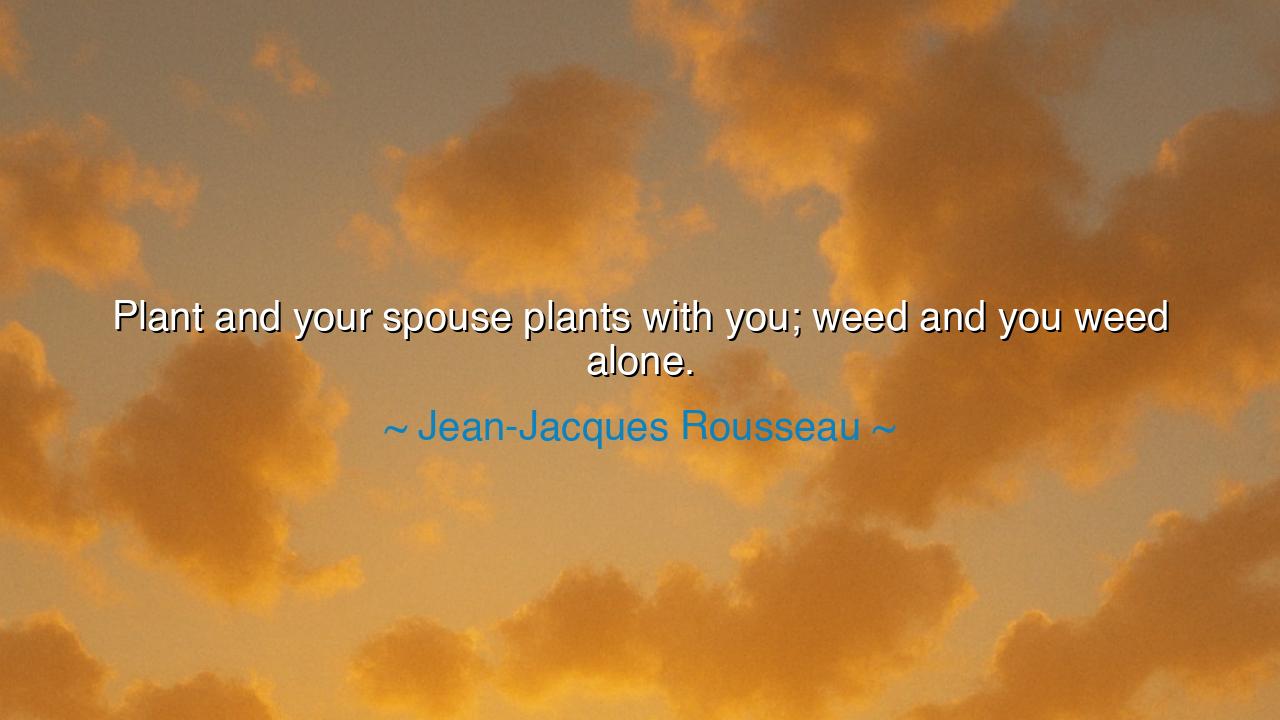
Plant and your spouse plants with you; weed and you weed alone.






"Plant and your spouse plants with you; weed and you weed alone." These wise words of Jean-Jacques Rousseau capture the essence of the intimate partnership that exists between two people bound by love, yet they also offer a sober reflection on the nature of individual burdens. Rousseau teaches us that while the act of growth, whether physical, emotional, or spiritual, is often shared in the warmth of companionship, the struggles and trials that accompany the inevitable moments of difficulty are often faced alone. In the shared effort of planting, there is joy and unity, but in the act of weeding—removing what hinders growth—one must often take on the responsibility and pain by themselves.
In ancient wisdom, the metaphor of planting and weeding has long been used to describe the balance of life. The Greeks and Romans understood that life is a garden, where one must tend to both the growth and the obstacles that arise. Consider the philosopher Socrates, who often spoke of the nurturing of the soul through disciplined reflection and ethical living. In his dialogues, he likened the soul to a garden, and the virtues were the seeds that needed care, while the vices were the weeds that needed to be pulled. Yet, Socrates also acknowledged that in the pursuit of wisdom, there were moments of isolation—times when each individual had to confront their own inner turmoil without the comfort of another’s presence.
Rousseau’s words also echo the sacrifices made by Hercules, whose legendary twelve labors were his alone to bear. Although he had allies in some of his adventures, the true work—whether it was cleaning the Augean stables or capturing the Golden Hind—was his alone. Hercules’ trials speak to the solitude of struggle, where even in the company of others, the weight of personal responsibility cannot be shared. Much like the weeds in the garden, the challenges we face in life are often deeply personal and require the inner strength of one’s own character to overcome.
In real life, we see this truth in the lives of great leaders such as Nelson Mandela, who, despite the support of his comrades in the fight against apartheid, endured immense personal suffering and hardship in solitary confinement. While he had many to plant seeds of hope and justice with, the weeds—the doubts, the fears, and the isolation—were his alone to confront. Mandela’s strength came not from the support of his fellow activists, but from his ability to endure the trials of imprisonment on his own. It was in those solitary moments, where he weeded his own soul, that he found the fortitude to stand firm for his country’s future.
This notion of personal responsibility is also present in romantic partnerships. In marriage, as Rousseau suggests, there is much joy in planting together, in building a life filled with dreams, love, and shared goals. But when adversity strikes, when the weeds of hardship take root—whether through illness, financial strife, or the disillusionment of everyday life—each partner may find that they must confront their personal fears, insecurities, and challenges alone. A partner may stand by, but the internal work of healing, understanding, and growth is ultimately a solitary journey. In such moments, one must have the courage to face these trials with grace and fortitude, knowing that while the burden of weeding may be theirs alone, the planting remains a shared joy.
The lesson in Rousseau’s words is one of acceptance and self-reliance. While relationships bring shared strength and support, they also bring moments when each person must confront their own internal struggles without expecting their partner to bear the same weight. Partnership is not about ensuring that both individuals always carry the same load; it is about sharing the joy and growth, while also respecting the need for each person to face their own personal battles. Life is a balance between planting together—cultivating the shared dreams, goals, and love—and weeding alone—facing the difficulties and sacrifices that come with those very dreams.
Therefore, in our own lives, we must learn to plant with those we love, nurturing our shared hopes, and aspirations. But when the weeds of hardship emerge, we must be ready to tend to them on our own, recognizing that personal growth often requires solitude and self-work. Let us honor our shared joys, but let us also cultivate the strength to face the private struggles with courage, knowing that in the end, we grow not only through the love we receive, but through the work we do alone. Just as in the garden, both cooperation and independence are essential for flourishing.






AAdministratorAdministrator
Welcome, honored guests. Please leave a comment, we will respond soon